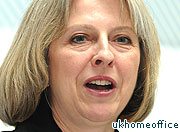More addicts will be helped to become drug free, and not simply kept on substitute drugs, the Government has said.
The previous Labour Government was slammed for its ‘harm reduction’ method of dealing with drug addicts, which includes keeping abusers hooked on methadone as a substitute for heroin.
But the coalition Government has hit out at situations where addicts are ‘parked’ on a substitute drug. “This must change”, its new drugs strategy stated.
Decriminalising
The strategy said substitute prescribing “continues to have a role” but the Coalition wants more people off drugs altogether.
The Government also makes clear that decriminalising drugs is not the answer.
This week Prof David Nutt, a former Government drugs advisor, said drugs such as cannabis, speed and ecstasy should be licenced.
Prof Nutt was sacked from his advisory role for criticising Government policy on cannabis.
Strategy
Home Secretary Theresa May ruled out liberalisation and decriminalisation as a way to deal with drugs.
She said that some respondents to a consultation on the strategy “advocated liberalisation and decriminalisation as a way to deal with the problem of drugs”.
But: “This Government does not believe that liberalisation and legalisation are the answer”, she said.
Full recovery
In the foreword to the new drugs strategy Mrs May said the Government is “determined to break the cycle of dependence on drugs and alcohol and the wasted opportunities that result”.
She added: “The solutions need to be holistic and centred around each individual, with the expectation that full recovery is possible and desirable”.
Announcing the strategy, the Home Office also said the Government will introduce immediate powers to temporarily ban so-called ‘legal highs’, “as soon as they become a cause for concern”.
Wrong
The strategy also states the Government will continue to provide “accurate” and “reliable” information on the effects and harms of drugs through the controversial ‘FRANK’ service.
Last year it was revealed that FRANK, which includes a telephone hotline, was giving teenagers the wrong advice about drugs.
The Home Office also made clear the Government would “continue to rely on the expert and independent advice” of the Advisory Council on the Misuse of Drugs (ACMD).
In 2004, under advice from the ACMD, the Labour Government downgraded cannabis from class B to class C. It proved to be a disaster and the Government reversed the policy in 2009.
Cannabis
Professor Nutt is a former chairman of the ACMD. In a recent interview with the Guardian newspaper he said: “I think the space between alcohol and caffeine – which includes tobacco, speed, cannabis and ecstasy – I would allow regulated access to all of them, such as the Dutch coffee shop model.
“I would allow regulated access controlled by the site of availability and sensible pricing to prevent excessive use.”

